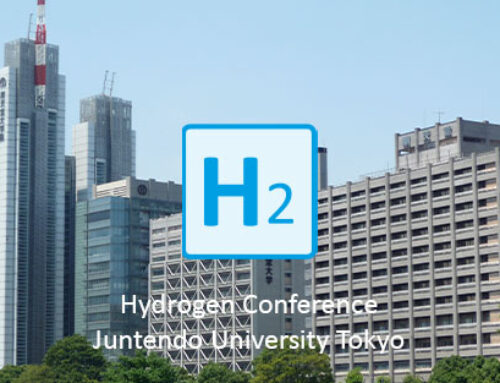What is convincing about molecular hydrogen (H₂) are the diverse health benefits as well as the agricultural applications – especially in the form of inhalation and hydrogen-rich water.
Hydrogen-rich water possesses selective antioxidant properties as it neutralizes harmful free radicals such as hydroxyl radicals while preserving beneficial reactive oxygen species such as hydrogen peroxide and nitric oxide. This makes H₂ a unique therapeutic agent for reducing oxidative stress, which is involved in the development of numerous chronic diseases. Thanks to its small molecular size, H₂ can easily penetrate cell membranes and exert systemic effects such as improved nutrient absorption and cellular protection within minutes of ingestion.
Hydrogen-rich water during sports and physical activities
In sports and other physically demanding activities, hydrogen-rich water can support recovery by reducing inflammation and oxidative stress, potentially improving performance. In addition, H₂ shows promising potential for mental tasks, such as chess, as it improves neuronal health and protects the brain from oxidative damage. Initial studies also suggest that hydrogen-rich water increases the bioavailability of vitamins and nutrients and promotes overall metabolic efficiency, which could be beneficial for both physical and cognitive activities.
Hydrogen: Antifibrotic Effects in Lung Diseases
Molecular hydrogen (H₂) not only exhibits antioxidant and anti-inflammatory properties, but also antifibrotic properties, making it a promising therapeutic option. In a study that investigated pulmonary hypertension (MPH) induced by monocrotaline (MCT) and associated fibrotic changes in the lungs, the positive effects of inhaled hydrogen were found.
So-called mast cells play a crucial role in the inflammatory and fibrotic processes. Inhalation of hydrogen significantly reduced the number and activity of mast cells. This led to lower collagen formation, a reduced amount of elastic and reticular fibers in the lungs and an overall weakened fibrotic reaction. Hydrogen thus had a regulating effect on the extracellular matrix by slowing down the tissue remodeling process and restoring balance in the local microenvironment of the lungs.
In summary, this research demonstrates that molecular hydrogen can have a protective and antifibrotic effect in lung diseases characterized by inflammation and fibrotic changes. This opens new perspectives for the therapeutic use of H₂ in inflammatory and fibrotic diseases, particularly those related to the lung.
Hydrogen inhalation can reduce inflammation in asthma and COPD
More and more studies are showing that hydrogen gas can be a valuable support for people with respiratory diseases such as asthma and COPD. Study PMID 32407476 found that even a single 45-minute inhalation of hydrogen gas can have a noticeable effect on inflammatory processes in the airways.
Participants with asthma and COPD participated in a study in which they inhaled hydrogen. After just this single session, measurable changes in various inflammatory markers in the body were observed. For example, certain neurotransmitters that play a role in inflammation decreased – especially in asthma patients (variants of intrinsic asthma (non-allergic asthma) and extrinsic asthma (allergic asthma)), a decrease in IL-8, a typical inflammatory marker, was observed. Other levels, such as IL-4 and IL-6, which are associated with chronic inflammation, also decreased after hydrogen inhalation. This suggests that inhaling hydrogen can have a calming effect on the immune system and balance overactive inflammatory responses in the body.
Accordingly, even a single hydrogen inhalation session lasting 45 minutes can positively influence the inflammatory state in the airways. This is a promising approach for the adjunctive treatment of asthma and COPD when inhaled continuously.
Hydrogen-rich water in agriculture and plant cultivation
In agriculture and plant cultivation, molecular hydrogen (H₂) also shows great potential, especially through the use of hydrogen-rich water to improve plant growth and health. The antioxidant properties of H₂ can reduce oxidative stress in plants caused by environmental factors such as drought, heat or high salt concentrations. Studies suggest that hydrogen-rich water promotes seed germination, improves root growth and increases resistance to biotic and abiotic stress factors. In addition, the application of H₂ in agricultural systems can optimize nutrient uptake and increase water use efficiency, which is particularly beneficial in regions with limited resources. This makes H₂ a promising, sustainable option for increasing yields and supporting environmentally friendly agriculture.
Hydrogen shows great potential in agriculture, especially in terms of plant health and yield improvement. It has antioxidant properties that protect plants from oxidative stress and increase their resistance to environmental factors such as drought and extreme temperatures. H2 improves photosynthesis, promotes growth and increases plant vitality. It also has the potential to influence the soil microbiome and improve soil quality, which could lead to more sustainable agricultural practices in the long term. H2 could thus contribute to efficient and more environmentally friendly agriculture.
Hydrogen has been shown to have a positive effect on seed germination, strengthen plant health and increase crop yields. At the same time, it can improve plant resistance to abiotic stress such as drought or salinity, which is particularly important in view of climatic challenges. This opens up new perspectives for sustainable agriculture and food production.
Sources frontiersin.org









